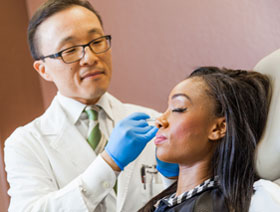 Sports are fun and a good way to stay fit and healthy, but there are special considerations athletes need to take regarding skin infections like Athlete’s foot. Let’s take a look at some common skin infections, how to treat them, and how to prevent them.
Sports are fun and a good way to stay fit and healthy, but there are special considerations athletes need to take regarding skin infections like Athlete’s foot. Let’s take a look at some common skin infections, how to treat them, and how to prevent them.
Athlete’s Foot
Athlete’s foot is a fungal skin infection that often starts between the toes when feet have remained sweaty for long periods of time in confined shoes. Symptoms include an itchy, scaly rash on the feet, inflamed skin, burning or stinging, and blisters. Skin may appear dry and scaly on the bottom of the foot and extend up the side of the foot.
Athlete’s foot is very contagious and easily spreads on towels, locker room floors, and contaminated clothing. Athlete’s foot can be treated with over-the-counter antifungal medications, but the infection can be persistent and often comes back.
When to See a Dermatologist
Come see us if you have a rash on your foot that doesn’t improve after two weeks with an over-the-counter antifungal product. Also seek treatment if you have signs of infection such as swelling, pus, or fever. If you have diabetes and suspect Athlete’s foot, don’t delay in coming in for an appointment. A minor fungal infection can quickly develop into a more serious foot problem in diabetics.
Treatment for Athlete’s Foot
Most Athlete’s foot infections clear up with a prescription-strength cream or ointment such as clotrimazole, econazole or ciclopirox. For more serious infections, we can prescribe an oral antifungal such as terbinafine or itraconazole. You may need both a topical and an oral antifungal to be rid of the infection.
Other Skin Infections That Can Affect Athletes
Athletes are at an increased risk of skin infections due to skin-to-skin contact during training and matches; warm, moist conditions in locker rooms, showers, and training rooms; and the sharing of athletic equipment. Anything that itches, burns, or is infected should be seen by a dermatologist. Without treatment, skin conditions can worsen and/or spread to other teammates.
Other common skin infections in athletes include staph, herpes, and ringworm.
- Staphlyococcus aureus (“Staph”) is a bacterial infection that causes painful sores with pus surrounded by redness. A fever may be present as well. Staph infections are particularly dangerous when they are antibiotic-resistant. A staph infection that is resistant to several common antibiotics is known as MRSA.
- Herpes gladiatorum is a skin infection caused by Herpes Simplex 1, the same virus that causes cold sores in the mouth. The infection often affects wrestlers who have close skin-to-skin contact. Lesions usually occur on the face, trunk, or extremities. Lesions around the eyes require immediate medical attention.
- Ringworm is caused by the same fungus that causes Athlete’s foot, but it appears in different areas of the body. It thrives in warm, moist areas and is more likely to occur when you are often wet, including from sweating, and when you have minor injuries to the skin, nails, or scalp. Ringworm in the groin area may also be called jock itch.
Preventing Skin Infections in Athletes
Prevention is key when it comes to athletes and skin infections. Here are some tips to keep infections at bay.
- Clean and cover cuts and scrapes until they are healed so germs can’t take hold.
- Avoid blisters by wearing properly fitted footwear and socks (two pairs of socks, if necessary).
- Wear moisture-wicking clothing that helps keep skin dry.
- Use sandals or shower shoes in the locker room.
- Wash your entire body after all practices and games using an antimicrobial soap.
- Use a clean towel after showering and your own personal items, such as soaps, razors, etc.
- Wash clothes and towels after each use. Wash sports bags regularly, too.
- Disinfect athletic equipment per the manufacturer’s instructions.
- Check athletes’ skin regularly and report any concerns.
- Never use sandpaper or bleach to pass a skin check. These will cause more damage and put the athlete and others at risk.
If you or an athlete you know has a skin infection, we can help. Make an appointment at Arizona Dermatology with one of our board-certified dermatologists today.


